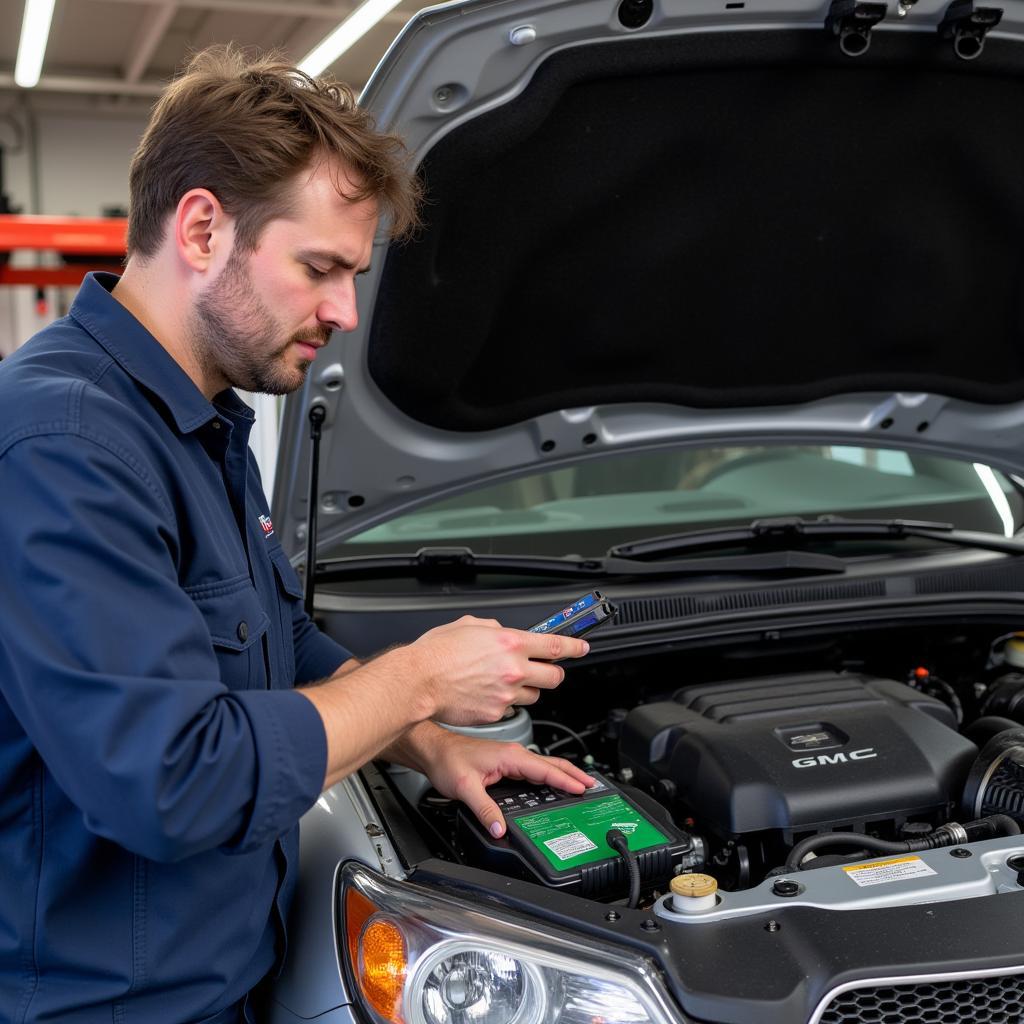A malfunctioning car AC system can make driving unbearable, especially during hot weather. One of the most common culprits is a leak in the AC system. Knowing how to diagnose and fix this issue can save you money and keep you comfortable on the road. This comprehensive guide will walk you through the process of identifying and repairing leaks in your car’s AC system. You’ll learn about the common causes, diagnostic techniques, and repair options available. Learn how much is it to fix a car ac leak and troubleshoot your AC problems today.
Understanding Your Car’s AC System
Before diving into leak detection and repair, it’s helpful to understand the basic components of your car’s AC system. The system operates on a closed loop, circulating refrigerant to cool the air. Key components include the compressor, condenser, evaporator, expansion valve or orifice tube, and connecting hoses and lines. Any breach in this closed loop can lead to refrigerant leakage and reduced cooling performance. A leak can occur in any of these components, making accurate diagnosis crucial.
Common Causes of Car AC Leaks
Several factors can contribute to leaks in your car’s AC system. Age and wear and tear are primary culprits. Over time, seals and hoses can become brittle and crack, leading to refrigerant loss. Corrosion, often due to road salt and environmental exposure, can also weaken components and cause leaks. Physical damage from road debris or collisions can puncture hoses or damage the condenser. Incorrect installation or servicing of AC components can also create vulnerabilities and lead to leaks.
How to Detect a Leak in Your Car AC System
Identifying the source of an AC leak requires a systematic approach. One common method involves using a UV dye. This dye is injected into the AC system and circulates with the refrigerant. A UV light is then used to pinpoint the leak location by revealing the fluorescent dye. Electronic leak detectors can also be used to sniff out refrigerant escaping from the system. Another method involves pressurizing the system with nitrogen and listening for escaping air or using soapy water to identify bubbles at the leak site. It’s crucial to remember that refrigerant leaks can be harmful to the environment, so proper handling and disposal are essential.
“Regular maintenance is key to preventing AC leaks. Inspecting hoses and connections for signs of wear and tear can help you catch potential problems early on,” advises John Miller, a certified automotive technician with over 20 years of experience.
DIY vs. Professional Repair
Minor leaks, such as those in easily accessible hoses, might be manageable for DIY enthusiasts. However, more complex leaks involving components like the compressor or evaporator often require specialized tools and expertise. Incorrect repairs can further damage the system and lead to costly repairs down the road. If you’re unsure about your abilities, seeking professional help is always the best course of action. Find out how much to fix leak in car ac before you start the repair process.
Steps to Fixing a Car AC Leak (For Minor Leaks)
If you’re comfortable tackling a minor leak, here’s a general guide. Remember to always consult your vehicle’s service manual for specific instructions.
- Gather the necessary tools and materials: This may include a replacement hose, sealant, AC system sealant, refrigerant, and safety glasses.
- Locate the leak: Use one of the detection methods mentioned earlier.
- Depressurize the system: This is a crucial safety step.
- Replace the damaged component: If it’s a hose, disconnect the old one and install the new one, ensuring proper connections and seals. If you are wondering how much for fixing ac hose leak in car, check out this article.
- Recharge the system: Add the correct type and amount of refrigerant.
Preventing Future Leaks
Regular maintenance is crucial for preventing future AC leaks. This includes periodic inspections of hoses, connections, and components for signs of wear, corrosion, or damage. Ensuring the system is properly charged with refrigerant and lubricating the seals can also extend its lifespan. “Protecting your car from extreme temperatures can also help prevent stress on the AC system,” adds Maria Sanchez, a senior automotive engineer. You can learn how much to fix car ac leak from this helpful resource.
Conclusion
Addressing leaks in your car’s AC system promptly can prevent further damage and restore comfortable driving conditions. Whether you choose a DIY approach for minor leaks or seek professional help for more complex issues, understanding the causes, detection methods, and repair options is crucial. Don’t hesitate to contact us at AutoTipPro for expert advice and assistance. We’re here to help keep you cool on the road. Our phone number is +1 (641) 206-8880 and our office is located at 500 N St Mary’s St, San Antonio, TX 78205, United States.





Leave a Reply